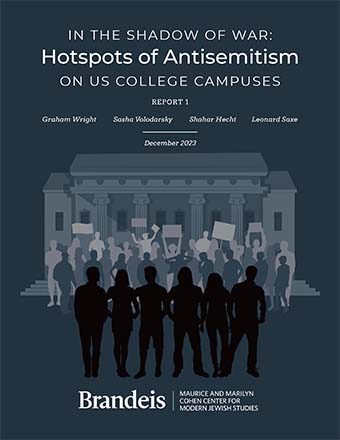In the Shadow of War: Hotspots of Antisemitism on US College Campuses
Graham Wright, Sasha Volodarsky, Shahar Hecht, and Leonard Saxe
December 2023
“In the Shadow of War: Hotspots of Antisemitism on US College Campuses” describes Jewish students’ perceptions of antisemitism on 51 US college campuses in the wake of the Israel-Hamas war. The findings are based on survey data collected from nearly 2,000 Jewish undergraduate students at schools with large Jewish student populations. To understand the contours and prevalence of hostile school climates, we asked respondents about their perceptions of anti-Jewish and anti-Israel hostility on their campuses and their concerns about antisemitism at their schools. Because responses to these three questions were highly correlated, they were combined to form an overall measure of Jewish students’ perceptions of a hostile antisemitic climate at their respective schools, allowing for a ranking of schools on this measure.

Key Findings
- Antisemitic hostility varies dramatically from one campus to the next. At some schools, the vast majority of Jewish students we surveyed reported that there is a hostile climate toward Jews and Israel on their campus, while at other schools, substantially fewer Jewish students feel this way.
- At the schools with the highest perceived levels of antisemitic hostility, Jewish students were more likely to report experiencing insult or harassment in person and on social media, seeing antisemitic images, slogans, or graffiti, and being blamed for the actions of the Israeli government because they were Jewish. However, the variation between schools with respect to these experiences was significantly smaller compared to the variation in overall perceptions of hostility.
- At all schools, more students were concerned about antisemitism related to criticism of Israel than they were about antisemitism related to traditional anti-Jewish stereotypes. Concern about antisemitism related to criticism of Israel was not limited to those who, in the context of the war, had favorable views of the Israel government: Even among those who had unfavorable views of the Israeli government (44% of all respondents), nearly half (45%) were very concerned about antisemitism related to criticism of Israel.
- In the context of the war, at all schools, Jewish students were substantially more concerned about antisemitism coming from the political left than they were about antisemitism from the political right. Concern about antisemitism from the political left was not limited to politically moderate or conservative Jewish students: 41% of liberal Jewish respondents were very concerned about antisemitism from the political left (54% of the respondents were liberal).
- Jewish students are most likely to encounter anti-Israel hostility from other students on campus, as opposed to faculty or administrators. At the most hostile schools, about 80% of Jewish students reported encountering hostility toward Israel from other students “sometimes” or “often.” At these schools, 30% also reported encountering hostility toward Israel from faculty.
- Jewish students at campuses with higher levels of antisemitic hostility were much less likely to feel fully safe or comfortable on their campus and much less likely to feel that they “very much” belonged. At the same time and regardless of campus, we found no significant association between the levels of antisemitic hostility on campus and Jewish students reporting that concerns about antisemitism affected their daily lives.
This report is the first in a series aimed at identifying evidence-based strategies for effectively responding to antisemitism on campus.